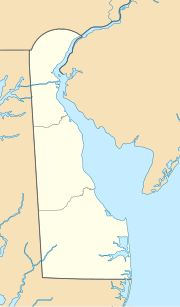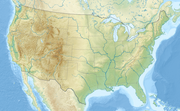Tyndall Branch (Deep Creek tributary)
| Tyndall Branch Tributary to Deep Creek | |
|---|---|
| Location | |
| Country | United States |
| State | Delaware |
| County | Sussex |
| Physical characteristics | |
| Source | confluence of Stoney Branch and Asketum Branch |
| • location | about 0.5 miles north of Hardscrabble |
| • coordinates | 38°37′24″N 075°28′41″W / 38.62333°N 75.47806°W[1] |
| • elevation | 28 ft (8.5 m)[2] |
| Mouth | Deep Creek |
• location | about 0.5 miles south-southwest of Old Furnace |
• coordinates | 38°39′15″N 075°31′28″W / 38.65417°N 75.52444°W[1] |
• elevation | 10 ft (3.0 m)[2] |
| Length | 3.58 mi (5.76 km)[3] |
| Basin size | 16.81 square miles (43.5 km2)[4] |
| Discharge | |
| • average | 20.53 cu ft/s (0.581 m3/s) at mouth with Deep Creek[4] |
| Basin features | |
| Progression | Deep Creek →Nanticoke River → Chesapeake Bay → Atlantic Ocean[3] |
| River system | Nanticoke River |
| Tributaries | |
| • left | Asketum Branch |
| • right | Stoney Branch |
| Waterbodies | Fleetwood Pond |
| Bridges | US 9 Baker Mill Road Fleetwood Pond Road |
Tyndall Branch is a 3.58 mi (5.76 km) long 3rd order tributary to Deep Creek, in Sussex County, Delaware.
Variant names[edit]
According to the Geographic Names Information System, it has also been known historically as:[1]
- Stoney Branch
Course[edit]
Tyndall Branch is formed at the confluence of Stoney Branch and Asketum Branch about 0.5 miles north of Hardscrabble in Sussex County, Delaware. Tyndall Branch then flows south-southwest to meet Deep Creek about 0.5 miles south-southwest of Old Furnace.[2]
Watershed[edit]
Tyndall Branch drains 16.81 square miles (43.5 km2) of area, receives about 45.1 in/year of precipitation, has a topographic wetness index of 690.47 and is about 14.38% forested.[4]
See also[edit]
References[edit]
- ^ a b c "GNIS Detail - Tyndall Branch". geonames.usgs.gov. US Geological Survey. Retrieved 15 February 2020.
- ^ a b c "Stoney Branch Topo Map, Sussex County DE (Trap Pond Area)". TopoZone. Locality, LLC. Retrieved 15 February 2020.
- ^ a b "ArcGIS Web Application". epa.maps.arcgis.com. US EPA. Retrieved 15 February 2020.
- ^ a b c "Tyndall Branch Watershed Report". watersgeo.epa.gov. US EPA. Retrieved 15 February 2020.


